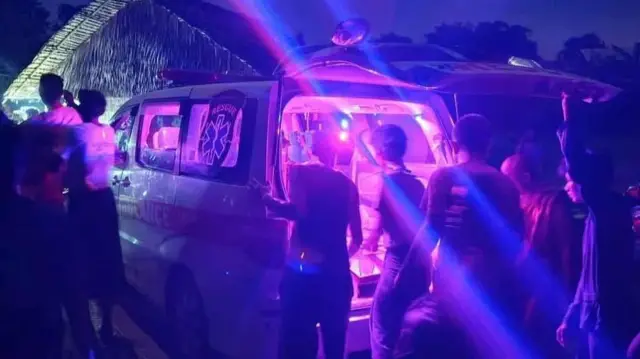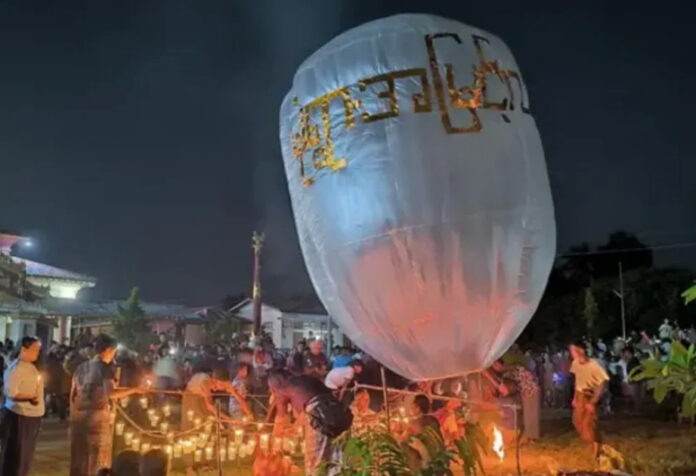At least 24 civilians were killed and nearly 50 others injured in a deadly airstrike by Myanmar’s military during a Buddhist festival in the Sagaing region. The attack, carried out using motorised paragliders, targeted a peaceful gathering on Monday evening and has drawn widespread condemnation from international human rights groups.
Deadly Airstrike on Peaceful Gathering

According to officials from Myanmar’s government-in-exile, the airstrike occurred in Chaung U township in central Myanmar, where around 100 residents had assembled to celebrate the Thadingyut full moon festival — a major Buddhist holiday symbolizing gratitude and reflection. The event also served as a peaceful protest against the junta’s military conscription policy and the upcoming national election, widely viewed as illegitimate by pro-democracy groups.
Witnesses said two bombs were dropped from motorised paragliders, instantly killing dozens of people. Locals reported that the explosion was so intense that identifying the victims was nearly impossible. “Children were torn apart,” said one organiser, describing the horrific aftermath as families scrambled to recover body parts and mourn the dead.
A Nation Caught in a Relentless Civil War
Myanmar has been engulfed in violence since the February 2021 coup, when the military overthrew the democratically elected government of Aung San Suu Kyi. The coup sparked a nationwide uprising and led to the formation of the People’s Defence Force (PDF) — a network of local militias aligned with the National Unity Government (NUG), the junta’s main opposition.
Over the past four years, thousands of civilians have been killed, and millions displaced, as battles rage across the country. The Sagaing region, a stronghold of anti-junta resistance, has seen some of the most intense fighting and airstrikes. Despite initial losses, the military has recently regained territory through a series of brutal offensives and aerial assaults.
Rise of Paraglider Attacks and Foreign Support

In recent months, Myanmar’s military has expanded its air capabilities, reportedly receiving new drone technology and support from China and Russia. These nations have provided technical assistance and equipment that have strengthened the junta’s firepower despite international sanctions restricting arms imports.
The military’s increasing use of motorised paragliders — or “paramotors” — represents a disturbing trend. Amnesty International noted that such attacks reflect both resource scarcity and desperation within the junta ranks, as they face dwindling supplies of aircraft and jet fuel due to sanctions.
Joe Freeman, Amnesty’s Myanmar researcher, said the latest attack “should serve as a gruesome wake-up call” for the international community. He urged the Association of Southeast Asian Nations (ASEAN) to toughen its stance and “adopt a stronger, more effective approach to protect Myanmar’s civilians.”
Resistance Struggles to Hold Ground
Despite their resilience, the PDF and allied ethnic militias are facing mounting pressure. China has reportedly been pressuring border-based rebel groups to halt arms transfers to resistance forces, undermining their ability to sustain long-term offensives. As a result, many insurgent groups have lost ground and are retreating from previously liberated areas.
A local PDF commander in Chaung U said they received intelligence about a possible air attack and attempted to disperse the crowd early, but the paragliders arrived sooner than expected. “It happened in just seven minutes,” he said, describing how he was injured while others around him were killed instantly.
International Condemnation and Political Implications
Human rights groups and world leaders have denounced the latest attack as another example of the junta’s disregard for civilian lives. Amnesty International called on ASEAN and the United Nations to impose stricter sanctions and increase diplomatic isolation of Myanmar’s military leadership.
The junta, meanwhile, continues to prepare for a general election scheduled for December 2025 — the first since the 2021 coup. However, critics argue that the election will neither be free nor fair, as opposition parties remain banned and voting will only occur in regions under military control. Many see the planned poll as an attempt by the junta to legitimize its rule after years of international criticism and domestic unrest.
A Nation in Mourning
As funeral ceremonies were held across the Sagaing region, grief and anger filled the air. Families buried their loved ones under tight security, fearing further attacks. Local monks and community leaders called for global attention to the ongoing humanitarian crisis, emphasizing that civilians are paying the ultimate price for the junta’s war on dissent.
The Chaung U tragedy underscores a grim reality: Myanmar’s conflict is far from over. As the junta intensifies its assaults and resistance forces struggle to regroup, ordinary citizens remain trapped in a cycle of violence, oppression, and loss — with little hope of peace on the horizon.

